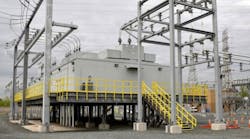The leaders of Public Service Enterprise Group Inc. on Monday said they plan to launch next year a distribution infrastructure investment program focused on last-mile improvements, plant and station upgrades and electric vehicle charging capacity. The plan, which executives plan to file with the New Jersey Board of Public Utilities before year’s end, could grow to more than $900 million.
Part of a broader investment plan that will put to work between $14 billion and $16 billion between now and 2025, New Jersey-based PSEG’s so-called infrastructure advancement program will address substations in flood zones and last-mile improvements such as replacements of poles, secondary lines and underground cables and upgrades of capacitors. It also allots money to EV infrastructure and gas metering and regulating stations along these lines:
- $250 million to $300 million to modernize six substations and older circuit breakers
- Reliability of last-mile parts: $175 million to $225 million
- Make-ready investments in last-mile EV and distributed energy infrastructure: $75 million to $100 million
- $125 million to $150 million to install roughly 2,000 EV chargers and related equipment at 65 company locations as execs work to transition their fleet to electric power
- Another $125 million to $150 million to modernize seven metering and regulating stations
Kim Hanemann, president and COO of the holding company's Public Service Electric and Gas Co. subsidiary, on Monday called these investments a first step toward improving the reliability of the company’s last mile and said it acknowledges that homes – thanks to the COVID-19 pandemic but also because of longer-term trends – are now many more people’s workplaces and more vehicles’ fueling stations, which requires a more reliable network at its fringes.
“Typically, these assets are 'run to failure,'” Hanemann said. “Now, we need to be proactive.”
The expected additional investments in distribution will not – along with the remainder of PSEG’s broader capital plan, which includes installing smart meters among many other things – require CEO Ralph Izzo and his team to issue new equity; they plan to use cash flows to fund the projects. PSEG in the first half of 2021 posted a profit of $471 million, which was down nearly 50% from the same period of 2020 thanks to plant retirements and other one-time adjustments. Operating profits rose 9% year over year to a shade more than $1 billion.
PSEG shares rose nearly 1% Monday to $61.21. Year to date, they have climbed about 10%, growing the company’s market value to about $31 billion.


